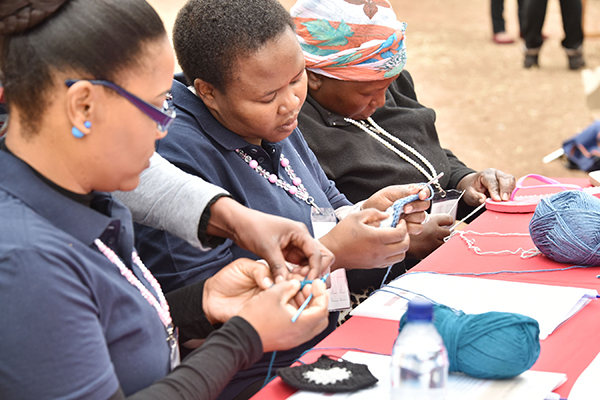
Mokoena learns a new skill at the Learning Festival arranged
by the Centre for Community Engagement.
Photo: Igno van Niekerk
For Mokoena it was just a regular day. Another day. Another rush. As a taxi driver you get used to the adrenaline, taking gaps, foot on the accelerator. Alert. Honking hooters. Angry drivers.
Then it came out of nowhere. A stroke. The one side of his body was going numb. What was happening? What about his job? His income? His life?
Fast-forward a few years.
I meet Mokoena at the Learning Festival arranged by the Centre for Community Engagement, in association with Bloemshelter on the University of the Free State’s Bloemfontein Campus. A reserved young man, Mokoena is busy at one of the stands where a range of people from rural communities come to learn new skills. At no cost. They then go back to teach the skills they learnt in their communities. Job creation, that’s the philosophy: as you develop, you need to develop others.
When I talk to Karen Venter, Head of Service Learning at the Centre for Community Engagement, the stories are overwhelming. “There was the lady who attended 19 workshops in two days. She went back to her community, shared her knowledge and became an entrepreneur helping others take care of themselves.”
New skills
Mokoena is also here to acquire new skills. After his stroke he was told by occupational therapy students about a project that teaches you to build your own house with raw materials. He takes out his cellphone with a sense of pride. Scrolls through some pictures: “This is my house. I built it from all kinds of things, cow manure, bottles, clay, other people’s rubbish.” The pictures show a house in a neat environment. Solid. Proud. A lot of healing came with building the house. Karen explains: “The physical work he was doing, pushing a wheelbarrow and working, but more than that – the knowledge that he could take charge, make a difference, work on a dream – the healing power of a sense of purpose. He became stronger and more confident.”
Victory
Mokoena walks back to the sewing workshop he was attending before sharing his story. The buzz continues inside the Equitas Building where artisans, entrepreneurs and UFS staff are sharing their skills. Sewing machines hum away and infrequent beeps sound from a table where an excited group of non-scientists have just completed the building of circuits. Faces light up with every beep. Hands raised. Fists clenched. Victory!
But the victory lies beyond the moment. It’s in the confidence, the learning, and the sharing that will be taking place when these people go back to their communities. Some will participate in research projects; others will benefit from curricular requirements leading students into distant communities, and others will be hosting workshops at the next Learning Festival.
And there will be more great stories. Like Mokoena’s.